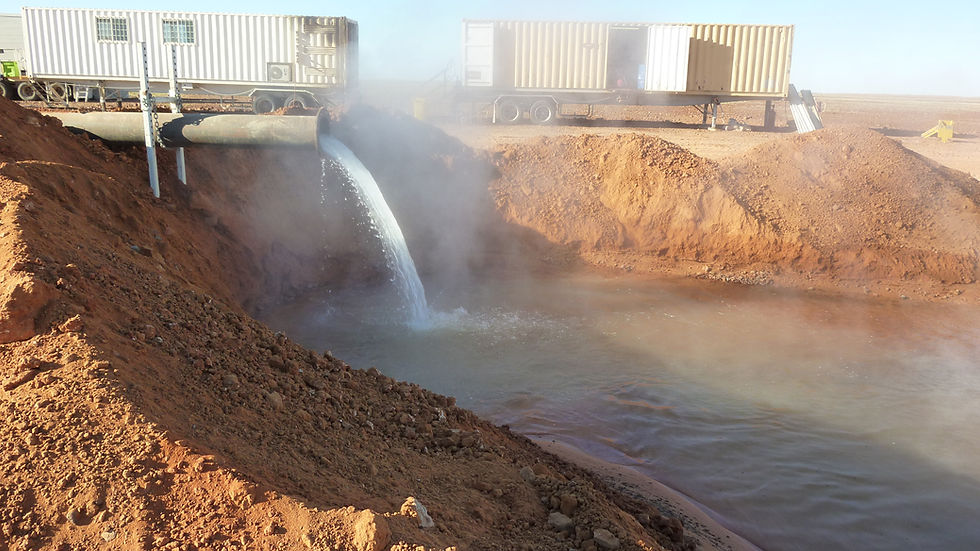Diamond Core Drilling: What Is It and When Should You Use It?
- mastermcc3
- Aug 19
- 4 min read
Updated: Sep 27

In the world of mining, construction, and geotechnical projects, diamond core drilling is widely regarded as the most effective and precise method for extracting subsurface samples. Unlike traditional drilling techniques that simply break through rock or soil, diamond core drilling allows for the collection of intact cylindrical samples (known as “cores”), which are essential for geological analysis and project planning.
But what exactly is diamond core drilling, how does it work, and when should you use it over other drilling methods? This article breaks down everything you need to know.
What Is Diamond Core Drilling?
Diamond core drilling is a rotary drilling technique that uses a hollow drill bit embedded with tiny, industrial-grade diamonds. Diamonds are the hardest naturally occurring substance, making them ideal for cutting through tough materials like granite, basalt, and concrete.
As the bit rotates, it grinds away the rock, while the hollow centre captures a cylindrical core sample that can be retrieved for study. This makes it the preferred method when accurate geological data or high-quality samples are required.
How Diamond Core Drilling Works
The process of diamond core drilling involves several key steps:
Site Preparation – establishing a drilling platform and safety systems.
Drill Setup – attaching a core drill rig with the appropriate diamond bit size.
Rotation & Cutting – the drill bit rotates at high speeds, grinding through the rock while water or drilling fluid cools the bit and removes debris.
Core Recovery – the cylindrical core sample is captured inside the drill barrel and removed for analysis.
Repeat Process – the drilling continues, extracting multiple cores at increasing depths.
Drill rigs may be mounted on trucks, trailers, or skids, making the system flexible enough for remote and challenging terrain.
Advantages of Diamond Core Drilling
Diamond core drilling has become the gold standard in exploration and construction projects for several reasons:
1. High Precision
Unlike hammer drilling or rotary blasting, diamond drilling extracts clean, intact cores, which provide accurate geological information.
2. Depth Capability
Diamond drills can reach extreme depths — over 2,400 metres in some mineral exploration programs.
3. Versatility
Diamond bits can cut through almost any material, from soft sedimentary rocks to the hardest igneous formations.
4. Minimal Damage
Because the process grinds rather than fractures the rock, it causes less disruption, making it ideal for structural testing and engineering projects.
5. Cost Efficiency in Exploration
Though initial setup may be expensive, diamond core drilling saves costs in the long term by providing better data with fewer holes compared to conventional drilling.
Limitations and Challenges
Like all methods, diamond core drilling has its challenges:
Higher Costs – equipment and diamond bits are more expensive than other methods.
Slower Penetration Rates – compared to percussion drilling, progress can be slower.
Skilled Operators Required – proper handling is essential to avoid bit wear and ensure core recovery.
Water/Fluid Dependency – requires continuous circulation of water or drilling fluid, which can be difficult in arid locations.
Applications of Diamond Core Drilling
Diamond core drilling is used across a wide range of industries:
1. Mineral Exploration
Core samples provide geologists with data on mineral composition, grade, and structure, which are essential for mine planning and feasibility studies.
2. Oil & Gas Exploration
While less common than other oil drilling methods, diamond core drilling is sometimes used for geological surveying and test wells.
3. Construction & Engineering
In civil projects, diamond drilling is used to test bedrock integrity, foundation strength, and tunnel planning.
4. Geotechnical Investigations
Engineers use core samples to assess soil and rock conditions before designing bridges, dams, and high-rise buildings.
5. Environmental and Hydrological Studies
Core drilling can help study groundwater systems and detect contaminants.
When Should You Use Diamond Core Drilling?
Diamond drilling is the best choice when:
You need accurate core samples for geological or engineering analysis.
Your project involves hard rock formations that other drills can’t penetrate effectively.
You require deep drilling (over 1,000m).
Structural integrity is important, such as in foundation analysis or tunnel construction.
Long-term project cost savings from better data outweigh higher initial expenses.
In contrast, for shallow holes, rapid drilling, or bulk sampling, other methods like rotary air blast (RAB) or reverse circulation (RC) drilling may be more practical.
Frequently Asked Questions
1. How deep can diamond core drilling go?
With the right equipment, diamond core drilling can exceed 2,400 metres in depth.
2. What size cores can be extracted?
Core diameters typically range from 30mm to 100mm, depending on project requirements.
3. Is diamond drilling noisy or disruptive?
Compared to percussion drilling, diamond drilling is relatively quiet and produces less vibration, making it suitable for urban projects.
4. How long does diamond core drilling take?
The timeline depends on depth, rock type, and project scope. While slower than percussion methods, it delivers superior data and precision.
5. How much does it cost?
Costs vary widely but are influenced by depth, geology, equipment, and location. While more expensive upfront, the long-term savings from reduced drilling sites often outweigh initial costs.
Final Thoughts
Diamond core drilling is an essential tool in exploration and engineering projects where accuracy, depth, and sample quality matter most. Its ability to deliver reliable geological data makes it invaluable for mineral exploration, large infrastructure, and geotechnical studies.
While it requires greater investment and expertise, the benefits in precision and data quality far outweigh the drawbacks, especially in high-value projects.
If you are considering drilling for exploration, construction, or water studies, partnering with an experienced drilling contractor ensures your project is carried out safely, efficiently, and in compliance with regulations.





Comments